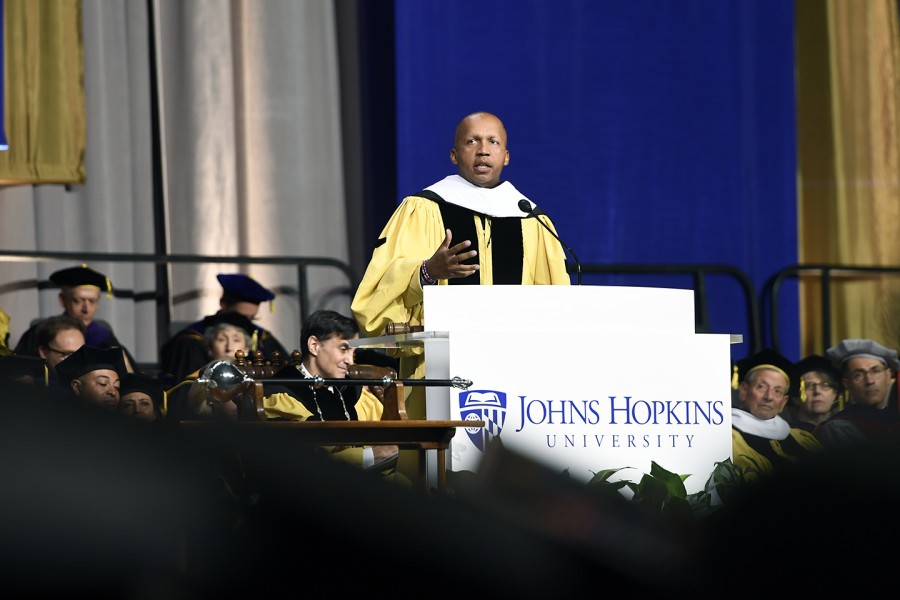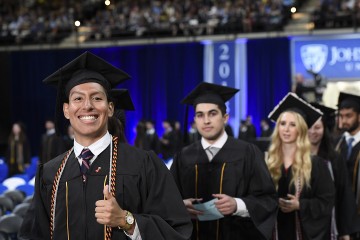In a powerful and stirring address to the Johns Hopkins University Class of 2018 on Thursday afternoon, social justice crusader Bryan A. Stevenson encouraged the new graduates to take their degrees and their knowledge out into the world and to make real change.
"We need you to leave this university with high expectations for what you can do to create a more just world," Stevenson said during the university's commencement ceremony at Baltimore's Royal Farms Arena. "I hope you will help find ways to change things."
Stevenson, who founded Equal Justice Initiative, an organization that has helped more than 125 wrongly condemned people on death row, was one of six honorary degree recipients and the featured speaker at the event. He told the graduates that there are four things they must do in order to change the world.
1. Get proximate to those who are suffering
"You have to find ways, no matter what your field of study ..., to get proximate to people who are suffering, to get closer to people who are excluded, to go into the parts of the community that other people say you shouldn't go to," Stevenson said. "... We need a class of graduates from this institution that looks for ways to get closer to the poor, the marginalized, the excluded, the incarcerated, those who are dealing with inequality and injustice. ... And no matter where you go, if you find ways to get past the barriers that exclude those who are disfavored, and you get proximate, you will discover something transformative. There is power in proximity."
2. Challenge and change existing narratives
"I think we have to talk about the fact the we live in a post-genocide society," Stevenson said. "Before Europeans were on this continent, there were native people here. And the Europeans that came to this continent slaughtered millions of native people. ... It was a genocide. But we didn't call it that. We said those native people are savages. We used this narrative of racial difference to justify the violence that we subjected native populations to.
"And that narrative of racial difference became a part of who we are. And I believe it was that narrative that made American slavery so insidious. I don't think the great evil of American slavery was forced labor or involuntary servitude. I think the real evil of American slavery was this ideology that we created that black people aren't the same as white people. ... It was this ideology of white supremacy that was the true evil of American slavery.
"And today that narrative of racial difference is still out there. It breaks my heart to look out at this amazing class of graduates and have to say to the black and brown graduates that even though you have a Johns Hopkins degree, even though you've done remarkable work, ... even though you have these great accomplishments, if you are black or brown, you will go places in this country where you may be presumed dangerous and guilty just because of your color. ... We've got to change the world by changing these narratives. There is something better waiting for us than we've experienced in this country, and I want us to get there."
3. Stay hopeful
"You cannot change the world if you allow yourself to become hopeless," Stevenson said. "I actually believe that hopelessness is the enemy of justice. Injustice prevails where hopelessness persists, and so you've got to find a way to stay hopeful. You either are hopeful or you're the problem. I hate saying it like that but I really do believe it, because your hope is your super power. Hope will allow you sometimes to stand up when other people say sit down. Hope will allow you to speak when other people say be quiet. When you're hopeful you can actually believe things and see things that other people can't."
4. Be willing to do things that are inconvenient and uncomfortable
"Sometimes you have to position yourself in uncomfortable places," Stevenson said. "And I'm here as a witness that when you do—even though it may be difficult, even though it may be intimidating—there is something magical, something powerful that happens on the other side of it.
"I believe if we're going to change the world," Stevenson concluded, "if we're going to create a new future, if we're going to use these degrees to allow things to change that must be changed, we have to consider that we cannot measure how we're doing by looking at how well we treat privileged people and powerful people and celebrated people. Our commitment to changing the world is going to have to be reflected in how we treat poor people, incarcerated people, neglected people, disfavored people. It's in that context that we change the world."
Posted in University News, Student Life
Tagged commencement 2018









